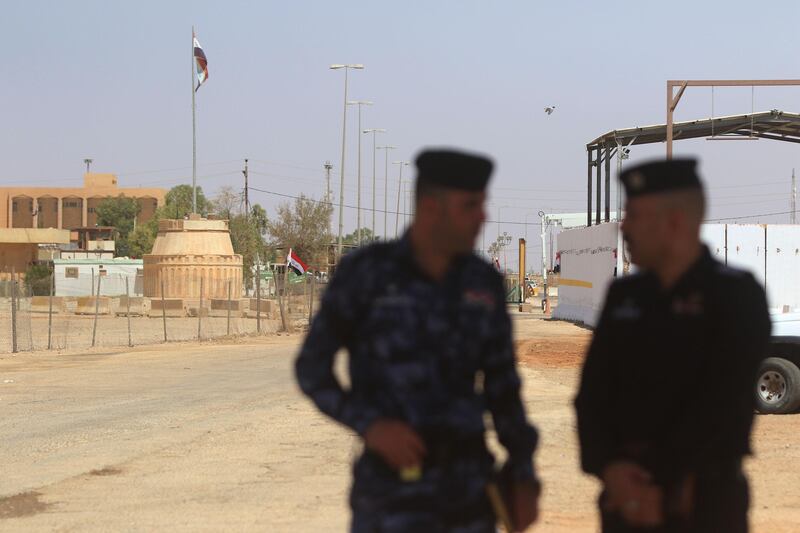Jordan and Iraq reopened the main border crossing between the two countries on Wednesday, two years after it was closed following ISIL's capture of large swathes of western Iraq.
The crossing, known as Karameh on the Jordanian side and Turabil in Iraq, sits along a 900-kilometre trade route linking Amman and Baghdad, and its closure in July 2015 dealt a blow to Jordan’s already fragile economy.
Jordanian businessmen wanting to export goods to Iraq were forced to switch to a more expensive route, sending goods by sea from Aqaba, Jordan’s sole port, to the Iraqi city of Basra. Exports to Iraq subsequently fell by 47 per cent in the first five months of 2016 from the same time period in the previous year, the World Bank said.
Amman and Baghdad said they had taken the decision to reopen the crossing after Iraqi forces regained control of the main road to Baghdad from the border.
"This (the reopening) will present a qualitative leap for ties in humanitarian and economic aspects between the two brotherly countries, most importantly the commercial ties … through this lively artery," Iraq and Jordan said in a joint statement.
“It will ease the flow of civilians and goods in both directions."
_______________
Read more:
[ Saudi Arabia and Iraq to reopen Arar border crossing after 27 years ]
[ Iraq PM congratulates military for 'overwhelming victory' in Tal Afar ]
[ Syrian army gains ground on Jordan border in south-west ]
_______________
The border post on the Iraqi side of the crossing was repeatedly attacked by ISIL after the extremists seized control of much of Anbar province — which runs along the entire border with Jordan — in the summer of 2014. On April 25, 2015, three suicide bombers detonated three car bombs near the post, killing five Iraqi border guards and injuring at least ten.
Three months later, in light of the security situation, Iraq took the decision to close the crossing.
The closure also deprived ISIL of taxes it had been imposing on cargo vehicles driving through territory held by the group between the border and Baghdad — though by that point only a trickle of vehicles were daring to venture along the treacherous route.
In February of this year, ISIL carried out an attack on another Iraqi border post near Jordan. That assault killed 15 guards, including two officers.
The border opening comes as a boost for Jordan's economy at a time when it has been heavily impacted by the crises in Iraq and Syria, along with a drop in remittances from the Gulf and the interruption of gas supplies from Egypt after repeated attacks by extremists on a pipeline there.
Although the country's national debt as a percentage of its GDP dropped by 1 per cent last month compared with the previous year, it still stood at 94.1 per cent, the official Petra news agency reported on Tuesday.
According to the finance ministry, the national debt stood at 26.55 billion dinars (Dh97.55bn) at the end of last month, compared with 26.09bn dinars in July last year.
The reopening of the Karameh-Turabil crossing "indicates that western Iraq has become safe and will allow Jordanian exports from food stuffs to agricultural products to return to Iraq after two years of absence", said Imad Hmoud, an independent business analyst. “There have been incidents of kidnapping and killings of Jordanian drivers who dared to cross the border before it was closed."
"The opening of the outpost is a boost to Jordan’s economy at a time [when] the budget deficit [has] swelled and the country’s debt is at an alarming level," he added.
Still, challenges for Jordanian exports to Iraq persist, particularly after Baghdad imposed a 30 per cent custom fee last year on goods from Jordan entering the Iraqi market. Jordan had previously been exempt from such fees.
“The opening of the border is good news for us, particularly for truck owners, industrialists, logistics providers," said Nabil Khatib, chairman and CEO of the Maltrans international freight company and the president of the Jordanian Logistics Association.
Thirty per cent of Maltrans's business comes from Iraq.
"The alternative route to Basra was too costly and required much time. By overland it will be much easier," Mr Khatib said.
Before the crossing closure, an average of 500 lorries crossed from Jordan into Iraq every day, Mr Khatib said.
But, he added, the 30 per cent custom fee levied on Jordanian goods by the Iraqi government is still a major obstacle hindering the flow of goods.
“Even if the borders are open, the fee will largely impact the flow of Jordanian exports to Iraq because of competition from [Iranian and Turkish products],” he said. Iran and Turkey also pay custom fees but their sheer size and the scale on which they can mass produce goods make them difficult for Jordan to compete with.
“If the fees are not cancelled, exports will be negatively impacted, as if the borders are still closed. There will be no cargo flow," Mr Khatib added.
"We hope they will be cancelled.”





